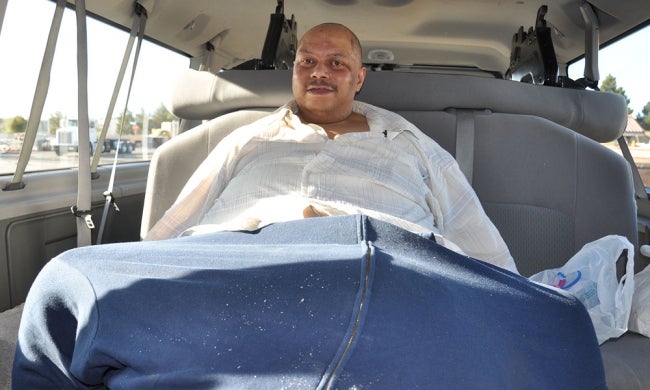TV review: The Man with the 10-Stone Testicles: a Bodyshock Special, Channel 4
Don't Call Me Crazy, BBC3

Your support helps us to tell the story
From reproductive rights to climate change to Big Tech, The Independent is on the ground when the story is developing. Whether it's investigating the financials of Elon Musk's pro-Trump PAC or producing our latest documentary, 'The A Word', which shines a light on the American women fighting for reproductive rights, we know how important it is to parse out the facts from the messaging.
At such a critical moment in US history, we need reporters on the ground. Your donation allows us to keep sending journalists to speak to both sides of the story.
The Independent is trusted by Americans across the entire political spectrum. And unlike many other quality news outlets, we choose not to lock Americans out of our reporting and analysis with paywalls. We believe quality journalism should be available to everyone, paid for by those who can afford it.
Your support makes all the difference.Some of the distress we see on television is representative; some of it stands only for itself. There are, for instance, half-a-million young people dealing with some kind of mental illness at any one time, which means that the handful of teenagers we watched in Don't Call Me Crazy speak on behalf of a much more substantial plight.
I don't know how many people have massive scrotal lymphedema, on the other hand, but I do know that the point of Warren, the unwilling star of The Man with the 10-Stone Testicles, was to be one of a kind. His unhappy condition could throw light on nothing but our prurient curiosity about human aberration. The first was a sensitive, thoughtful documentary about those for whom adolescence is more than usually bumpy. The second was a Bodyshock Special, its subtitle shouting at you like a fairground barker.
Don't Call Me Crazy was the result of "unparalleled access" to the McGuinness Unit in Manchester, a mental-health inpatient unit for teenagers, and although it began with an image that might have come from a more unreconstructed vision of such places – a girl pressing her nose into a porcine mask against the glass of an observation slit in a ward door – it was at first striking for the apparent normality of its residents.
Beth, a 17-year-old, admitted because of suicidal thoughts and anorexia, did remark that she liked "to see the bone" when talking about her self-image, but she did in such breezy and open tones that you assumed she was on the mend. Emma, a 15-year-old with OCD, was shy and quiet, but talked with a reassuring clarity about her problems. And even Gill, arms tiger-striped with the scars of self-harm, had her moments of ebullience.
Emma's story was the most encouraging. From a point at which she fretted helplessly about the rearrangement of her CDs during a staff search (she'd been up at 2am organising them because she was convinced her mother would die if she didn't), she steadily improved until she was ready to return home. But Gill and Beth were less responsive. Given any chance to escape, Gill took it, but the liberty she was after generally involved an overdose, or the opportunity to push a ballpoint nib so deep into her arm she had to be taken to hospital to have it removed. And Beth, with a face and a smile that could drop a teenage boy in his tracks, became so reluctant to eat that she eventually had to be sectioned. She clearly had faith in the film crew.
At one point, she furtively showed them the Diet Coke she'd smuggled into her room, so that she could stave off hunger with the minimal of calories. If it had been a razor blade, would they have felt obliged to inform on her? And even though it wasn't, did they owe an obligation to her, or to the people who were trying to make her better? Still not sure about the answer to that, but the trust of everyone in front of the cameras in those behind them was repaid by the end result.
I'm not so sure about The Man with the 10-Stone Testicles, although its subject, Warren, appeared drily in control of the humiliations he was subject to. "Would that be interesting in one of the British tabloid papers," he asked the director, as he perched his supper on the nearest available surface. "'Man Eats Dinner Off of Enlarged Testicle Sack'?" Oh, I think so, Warren, and I'm guessing they would finesse their gawping with the same light veneer of sympathy and concern as this film did. It's possible, I suppose, that the presence of a film crew tilted Warren's doctor towards the decision to do his operation pro bono. But I can't think of any other justification for it.
Join our commenting forum
Join thought-provoking conversations, follow other Independent readers and see their replies
Comments